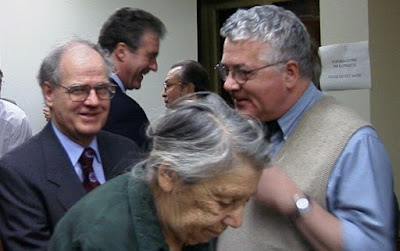The passing of David Jordan is a great loss to the Canadian Institute in Greece (CIG). David served as the Director of the Canadian Archaeological Institute at Athens, the predecessor of CIG, from 1996 to 2000, during some of its most difficult years when its continuing existence was at stake. As in everything else he did, he performed this task selflessly, efficiently, and successfully.
His passing is also a great loss to scholarship. A commanding authority on ancient magic and Greek curse tablets, he traveled widely in the scholarly world, and his opinion was regularly sought on a wide variety of topics in epigraphy, philology, and ancient religion. He possessed a rare and special talent, a quintessential gift, simultaneously to read and interpret the most difficult of ancient Greek epigraphical writing, scratchings on lead curse tablets. With very apparent ease ... I often watched him in action ... he brought order to chaos, producing wholly convincing readings from the most desperate texts. In all his scholarship he was a perfectionist; his research was meticulous and thorough, his arguments were balanced and cogent, and his obvious mastery of his subject, a mastery sans pareil, was everywhere in evidence. Because of this pursuit of excellence he did not publish nearly so much as his friends and colleagues would wish; his extremely high standards would not allow him to let anything go to press until he had solved every problem and examined, verified, and approved every detail. His exceeding care reminded me of descriptions of the method of composition of one of his favorite authors, Virgil, about whose writings we corresponded on a number of occasions.
The passing of David is most of all a tremendous loss to his many friends; we shall all miss him greatly. I first met him when we were both members of the American School of Classical Studies at Athens in the late ‘60s. We had much in common, a love of epigraphy, a love of Greece, and a love of the convivial vibrant life of modern Athens with its so many attachments to the ancient city. His accent and manners were those of a gracious southerner, a gentleman ... he was born in Georgia. He was engaging in conversation and good natured in disposition. He was generous in sharing his knowledge, the most generous scholar I have known. I cannot count the number of times he helped me ... no, I have a computer, I can count some of them: 227 citations among the curse tablets in PAA, and I have not counted elsewhere in Attic epigraphy, topography, and prosopography, to say nothing of the unrecorded number of times he saved me from error.
An epitome of our friendship may be found in our sharing of the organization and presentation of the conference Lettered Attica at the Canadian Institute on March 8, 2000. “Sharing” is hardly the correct word, as the idea of the conference was totally David's and, typically, he did the majority of the work. The papers were published 3 years later as volume #3 in the Institute’s series, “Lettered Attica” after the skillful editing and beautiful typesetting of our mutual friend of many years, Philippa Matheson.
David was most loyal and unstinting in his help to all his friends. Unfortunately that virtue was not always reciprocated and for no apparent reason he was denied tenure at two universities in the US, after which he returned to Greece, where a 3-year interim appointment as a librarian, a position most congenial to David, a bibliophile, was not made permanent. These setbacks were great personal disappointments to David, but the loss to these institutions was the Canadian Institute’s gain, for he was in Athens and free to assume the directorship of the Institute when it most needed a person of his character, administrative ability, and academic stature.
A philhellene par excellence. David was a lover of both ancient and modern Greece, and it was here in Athens that he lived the majority of his life, and it is here that he died.
Ave atque Vale. STTL.
John Traill
University of Toronto




No comments:
Post a Comment